
Expert Guide to WordPress Support Ticket Systems in 2025

As a WordPress developer and SEO specialist at Jackober, I’ve implemented dozens of support ticket systems for clients across various industries. One thing I’ve learned is that providing excellent customer support isn’t just a nice-to-have—it’s a critical component of business success in today’s digital landscape.
For businesses using WordPress, implementing a robust support ticket system can transform customer service operations, improve client satisfaction, and ultimately drive growth. But with numerous options available, choosing the right solution can be challenging.
In this expert guide, I’ll share my expertise on WordPress support ticket systems, covering everything from their benefits and essential features to detailed reviews of the top plugins and implementation best practices.
Understanding Support Ticket Systems for WordPress
A support ticket system is a customer service tool that helps businesses manage, organize, and respond to customer inquiries. Unlike email or phone support, ticket systems create a structured workflow for handling support requests, ensuring nothing falls through the cracks.
How Support Ticket Systems Work in WordPress
WordPress support ticket systems typically function through a plugin that adds ticket management functionality to your WordPress site. These systems generally include:
- Customer-facing submission forms: Where users can submit their questions or issues
- Agent dashboards: Where support staff can view, categorize, and respond to tickets
- Automated workflows: Including ticket assignment, notifications, and status updates
- Knowledge base integration: Connecting support requests with self-help resources
- Reporting tools: For analyzing support performance and identifying trends
The Evolution of WordPress Support Systems
WordPress support systems have evolved significantly over the years:
- Early days (2008-2012): Basic contact forms with email notifications
- Middle period (2013-2017): Dedicated ticket plugins with agent interfaces
- Modern era (2018-present): Comprehensive help desk solutions with automation, analytics, and omnichannel support
Today’s WordPress support ticket systems rival standalone SaaS solutions in functionality while offering the benefits of integration with your existing WordPress site.
Benefits of Implementing a WordPress Support Ticket System
Based on my experience implementing these systems at Jackober, here are the key benefits businesses gain from a proper support ticket system:
Improved Customer Experience
- Centralized communication: All support interactions in one place
- Faster resolution times: Structured workflows reduce response delays
- Consistent support quality: Templates and knowledge base integration ensure consistent answers
- 24/7 accessibility: Customers can submit tickets anytime, not just during business hours
- Multi-channel support: Capture requests from various channels (email, forms, chat)
Enhanced Internal Efficiency
- Workflow automation: Automatic routing, assignment, and prioritization
- Team collaboration: Multiple agents can work together on complex issues
- Knowledge sharing: Build an internal knowledge base from support interactions
- Resource allocation: Assign the right staff to the right issues
- Reduced redundancy: Avoid multiple agents working on the same issue
Business Intelligence and Growth
- Identify common issues: Spot recurring problems that might indicate product/service issues
- Customer insights: Understand what matters most to your customers
- Service improvement: Use ticket data to enhance products or services
- Performance metrics: Track resolution times, satisfaction scores, and agent performance
- Scalable support: Handle growing support volume without proportional staff increases
Cost Effectiveness
- Reduced support costs: Self-service options and automation lower overhead
- WordPress integration: No need for expensive standalone help desk software
- Customization options: Tailor the system to your specific needs
- Scalable pricing: Many solutions offer plans that grow with your business
- Retention improvement: Better support leads to higher customer retention
Essential Features of WordPress Support Ticket Systems
When evaluating support ticket plugins for WordPress, these are the key features to consider:
Core Ticket Management
- Ticket creation: Multiple submission methods (forms, email, etc.)
- Ticket assignment: Manual or automated assignment to agents
- Status tracking: Clear indication of ticket progress
- Priority levels: Ability to mark urgent issues
- Categorization: Organize tickets by department or issue type
- Custom fields: Collect specific information based on ticket type
User Experience Elements
- User-friendly interfaces: Intuitive design for both customers and agents
- Mobile responsiveness: Works well on all devices
- Email notifications: Updates for both customers and agents
- File attachments: Support for screenshots or documents
- Ticket history: Complete record of all communications
- Self-service options: Knowledge base integration
Administration and Management
- Role-based permissions: Control access based on user roles
- Workflow automation: Rules-based ticket routing and actions
- SLA management: Track compliance with service level agreements
- Reporting and analytics: Performance metrics and insights
- Customization options: Brand consistency and workflow adaptation
- Integration capabilities: Connect with other business systems
Advanced Capabilities
- Canned responses: Pre-written answers to common questions
- Knowledge base integration: Suggest articles before ticket submission
- Satisfaction surveys: Gather feedback on support quality
- Time tracking: Monitor time spent on resolving issues
- Multi-channel support: Email, chat, social media integration
- Automation rules: Trigger actions based on ticket properties
Top WordPress Support Ticket Plugins in 2025
Based on my implementation experience and thorough research, here are the leading WordPress support ticket plugins available today:
1. Awesome Support
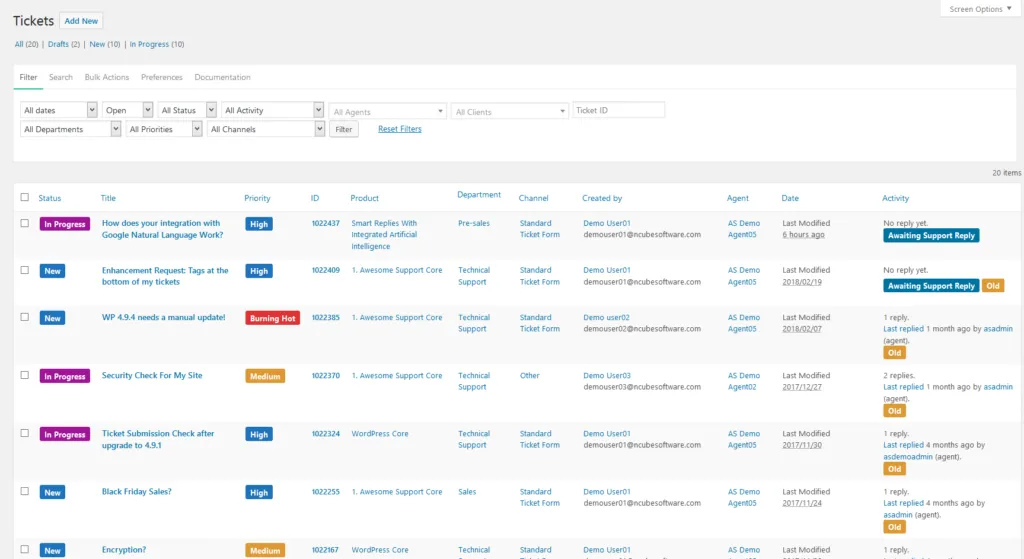
Awesome Support has established itself as one of the most comprehensive WordPress-native ticket systems.
Key Features:
- Complete ticket management system
- Custom fields and forms
- File attachments
- Multiple agents with custom roles
- Private notes between agents
- Email notifications and templates
- Time tracking
- Satisfaction surveys
Pricing:
- Free core plugin
- Premium add-ons ranging from 39−129 each
- Bundle packages from 199−499
Best For:
Awesome Support excels for businesses that need a dedicated WordPress-native solution with extensive customization options. It’s particularly suitable for small to medium-sized businesses that want to keep their support system within WordPress.
Limitations:
- Some advanced features require multiple add-ons
- The interface can be complex for new users
- Limited third-party integrations compared to SaaS alternatives
2. WP Fluent Support
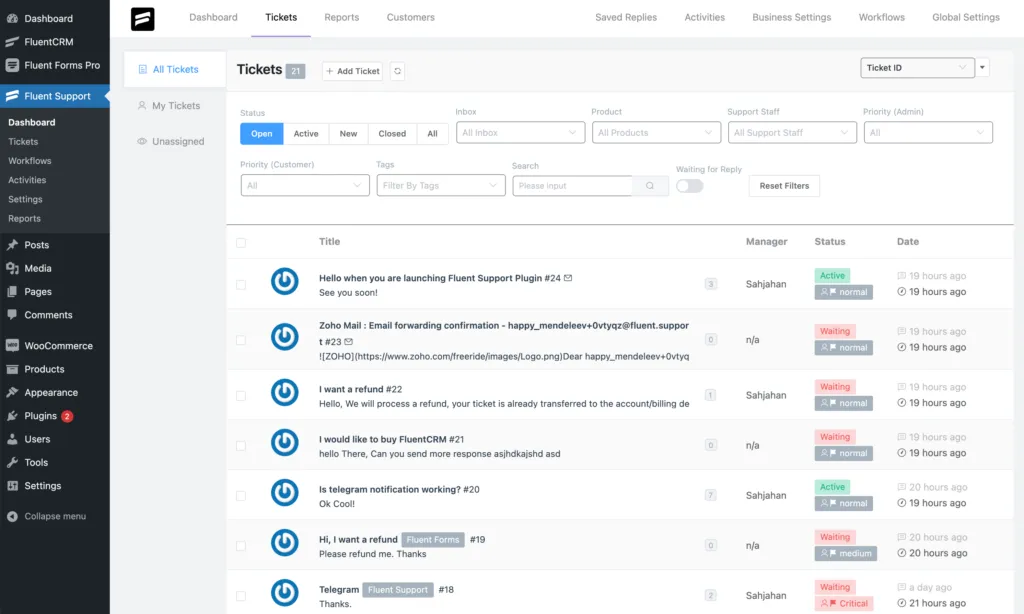
A newer entrant that has quickly gained popularity for its modern interface and performance focus.
Key Features:
- Clean, intuitive user interface
- Fast performance with minimal server load
- Customizable ticket forms
- Real-time notifications
- Internal notes and collaboration tools
- Canned responses
- Reporting dashboard
- File attachments
Pricing:
- Free core version
- Pro version: 59−199/year depending on sites
- Agency bundle: $299/year
Best For:
WP Fluent Support is ideal for businesses prioritizing a clean, modern interface and performance. It offers an excellent balance of features and ease of use, making it suitable for growing businesses.
Limitations:
- Newer product with smaller community
- Fewer integrations than established competitors
- Limited customization compared to Awesome Support
3. SupportCandy
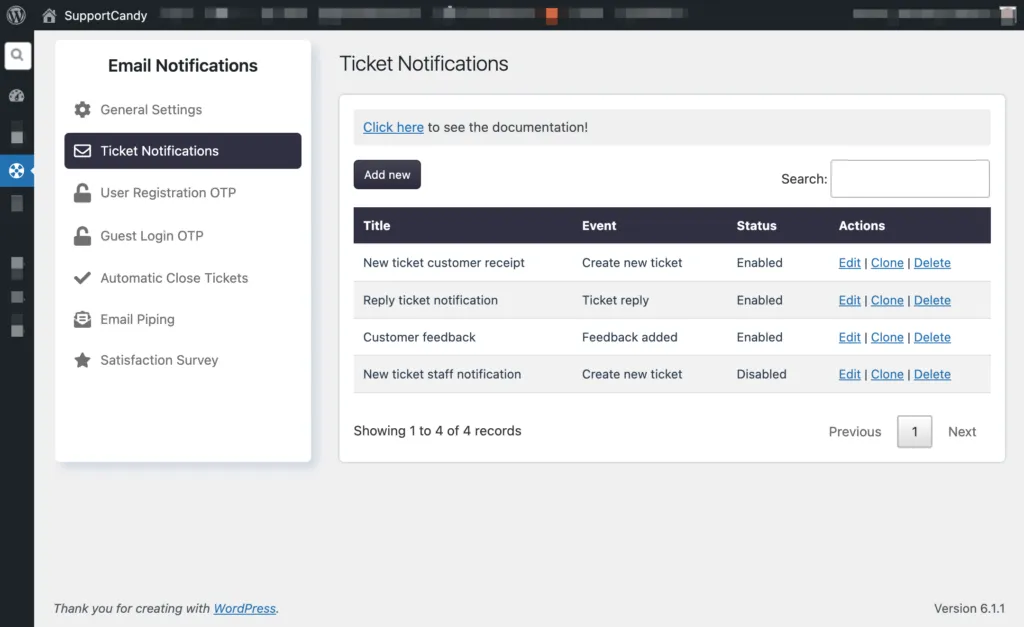
A feature-rich solution focusing on flexibility and customization.
Key Features:
- Unlimited agents and departments
- Custom ticket fields and forms
- Advanced ticket filtering
- Email piping (convert emails to tickets)
- Private staff notes
- Custom statuses and priorities
- Satisfaction surveys
- Advanced reporting
Pricing:
- Free core plugin
- Premium add-ons: 39−119 each
- Bundle options: 249−499
Best For:
SupportCandy works well for businesses with complex support structures requiring custom workflows and fields. Its flexibility makes it suitable for businesses with unique support processes.
Limitations:
- Interface not as polished as some competitors
- Performance can slow with very high ticket volumes
- Add-on costs can add up for full functionality
4. Tickets for WordPress by TotalSuite
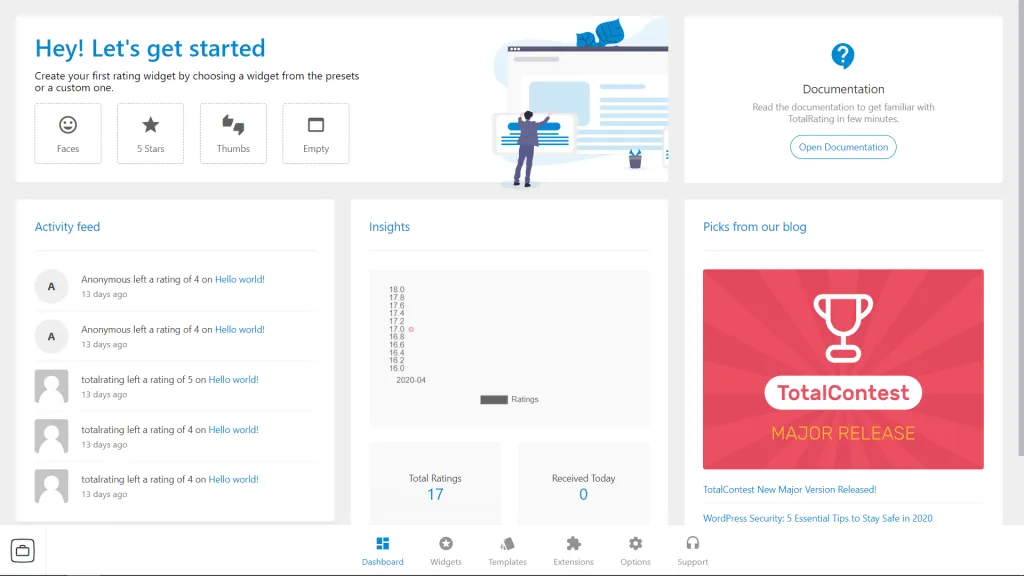
A comprehensive solution with a focus on business integration.
Key Features:
- Integrated with WooCommerce and Easy Digital Downloads
- Automated ticket creation from purchases
- Custom fields and forms
- Internal staff discussions
- Time tracking
- Email notifications
- Knowledge base integration
- Customer satisfaction ratings
Pricing:
- Core plugin: $79/year for single site
- Agency plans up to $499/year
- Lifetime licenses available
Best For:
This solution is particularly strong for e-commerce sites using WooCommerce or Easy Digital Downloads, providing seamless integration between purchases and support. For more on optimizing your e-commerce site, check our guide on E-commerce WordPress plugins.
Limitations:
- No free version available
- Less suitable for non-e-commerce sites
- Some users report steeper learning curve
5. HelpScout WordPress Integration
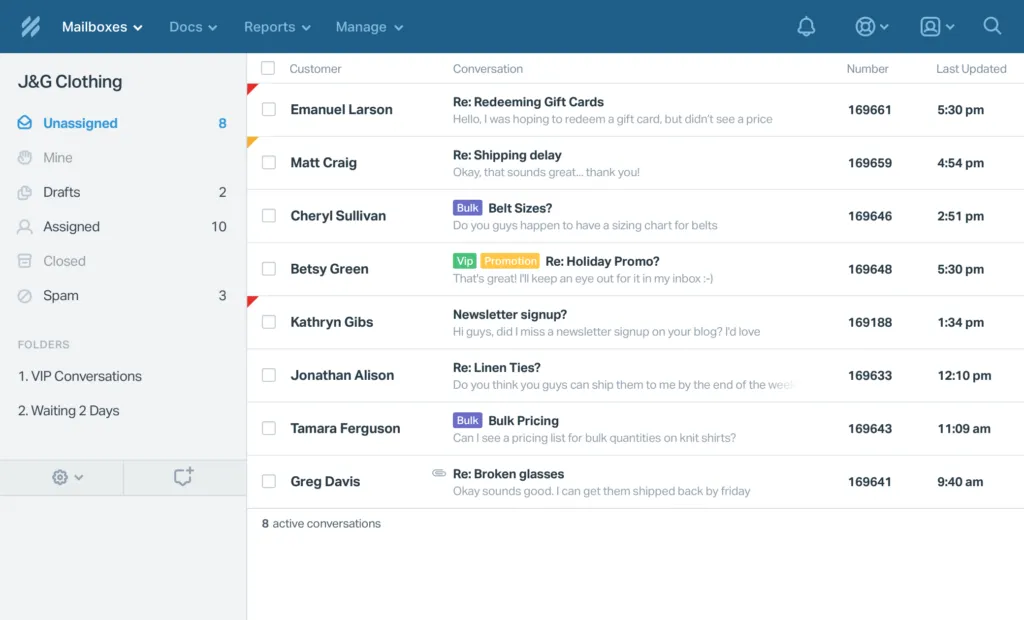
While not a native WordPress plugin, HelpScout offers excellent WordPress integration options.
Key Features:
- Enterprise-grade help desk capabilities
- Seamless WordPress integration
- Omnichannel support (email, chat, forms)
- Advanced automation and workflows
- Comprehensive reporting
- Knowledge base platform
- Customer profiles and history
Pricing:
- HelpScout plans: 20−40 per user/month
- WordPress integration: Free with HelpScout subscription
Best For:
HelpScout is ideal for businesses that need enterprise-level support capabilities while maintaining WordPress integration. It’s particularly suitable for growing teams with complex support needs.
Limitations:
- Higher cost compared to WordPress-native solutions
- Requires managing a separate platform
- Some features may be redundant for smaller businesses
6. WSDesk

A feature-rich solution with strong automation capabilities.
Key Features:
- Ticket submission via forms, email, or chat
- Custom fields and ticket types
- Advanced automation rules
- Agent collision detection
- Satisfaction surveys
- Time tracking
- Internal notes
- Reporting dashboard
Pricing:
- Single site: $89/year
- 5 sites: $129/year
- 25 sites: $199/year
- Lifetime licenses available
Best For:
WSDesk works well for businesses seeking strong automation capabilities to reduce manual support tasks. Its rule-based system can significantly streamline support workflows.
Limitations:
- No free version available
- Interface less intuitive than some competitors
- Limited third-party integrations
Implementing a Support Ticket System: Best Practices
Based on my experience implementing ticket systems for clients at Jackober, here are key best practices to ensure successful deployment:
Pre-Implementation Planning
Before installing any plugin, take these preparatory steps:
- Define support processes: Document your ideal support workflow
- Identify key metrics: Determine what you’ll measure to gauge success
- Map user journeys: Understand how customers will interact with the system
- Assess integration needs: Identify connections with other systems
- Establish SLAs: Define expected response and resolution times
Technical Implementation Considerations
Ensure your WordPress environment is properly prepared:
- Performance optimization: Support ticket systems can be resource-intensive, so follow our WordPress Page Speed Optimization guide
- Security hardening: Implement proper Cyber Security measures to protect sensitive support communications
- SSL implementation: Always use HTTPS for support forms by following our guide on How to add SSL to WordPress
- Database maintenance: Regular optimization to handle ticket data efficiently
- Backup system: Implement comprehensive backups before installation
User Experience Optimization
Create a seamless experience for both customers and agents:
- Intuitive forms: Design submission forms that gather necessary information without friction
- Clear status communication: Keep customers informed of ticket progress
- Self-service integration: Offer knowledge base articles before ticket submission
- Mobile optimization: Ensure support interfaces work well on all devices
- Branded experience: Customize the support portal to match your site design
Agent Training and Adoption
Prepare your team for the new system:
- Comprehensive training: Ensure all agents understand the system
- Standard operating procedures: Document common support scenarios
- Template development: Create response templates for common issues
- Performance expectations: Set clear metrics for support quality
- Feedback mechanisms: Gather input from agents to improve the system
Ongoing Optimization
Support systems require continuous improvement:
- Regular reporting review: Analyze key metrics monthly
- Knowledge base updates: Add articles based on common tickets
- Workflow refinement: Adjust automation rules based on performance
- Customer feedback incorporation: Use satisfaction data to improve
- System updates: Keep the plugin and all add-ons current
Integrating Support Tickets with Other WordPress Systems
A powerful aspect of WordPress support ticket systems is their ability to integrate with other aspects of your WordPress site:
E-commerce Integration
Connect your support system with your online store:
- Order history access: Allow agents to view customer purchase history
- Product-specific forms: Create custom forms for different products
- Automated post-purchase support: Trigger support workflows after purchase
- Return/refund processing: Handle product issues directly through tickets
For more on optimizing your e-commerce site, see our guide on Payment Gateways for WordPress.
Membership Site Integration
For membership or subscription sites:
- Member-only support: Restrict support access to active members
- Tier-based support: Offer different support levels based on membership tier
- Subscription status awareness: Alert agents to subscription status
- Renewal assistance: Create specific workflows for renewal issues
Learning Management System (LMS) Integration
For educational sites:
- Course-specific support: Route questions about specific courses
- Instructor assignment: Direct questions to the appropriate instructor
- Student verification: Confirm enrollment status automatically
- Progress-aware support: Give agents visibility into student progress
Community Forum Integration
Connect support with community discussions:
- Forum-to-ticket escalation: Convert complex forum questions to tickets
- Knowledge sharing: Use resolved tickets to create forum resources
- Community manager alerts: Notify moderators of trending issues
- Public/private switching: Move discussions between public and private channels
Custom Development vs. Ready-Made Solutions
As a WordPress Expert for Hire, I’m often asked whether businesses should opt for custom support ticket development or use existing plugins. Here’s my guidance:
When to Choose Existing Plugins
Ready-made solutions make sense when:
- Standard support workflows: Your processes follow typical patterns
- Budget constraints: Custom development exceeds available resources
- Quick implementation: You need a solution deployed rapidly
- Limited technical resources: You lack developer capacity for maintenance
- Scalable needs: Plugin pricing models accommodate growth
When to Consider Custom Development
Custom solutions become valuable when:
- Unique business processes: Your support workflows are highly specialized
- Deep integration requirements: You need seamless connections with proprietary systems
- Specific performance needs: Ready-made solutions can’t meet your performance requirements
- Regulatory compliance: You have specialized compliance requirements
- Complete brand control: You need pixel-perfect alignment with brand standards
Hybrid Approach
Often, the best solution is a hybrid approach:
- Start with a robust plugin foundation
- Customize specific aspects through hooks and filters
- Add custom functionality where needed
- Integrate with proprietary systems via custom code
- Optimize performance through targeted enhancements
This approach balances development costs with customization needs. At Jackober, we frequently implement this strategy to deliver tailored solutions efficiently.
Comparing WordPress Support Tickets to SaaS Alternatives
WordPress support ticket systems compete with dedicated SaaS platforms like Zendesk, Freshdesk, and Help Scout. Here’s how they compare:
Advantages of WordPress-Based Systems
- Cost efficiency: Generally lower total cost of ownership
- Seamless site integration: Native connection to your WordPress site
- Data ownership: All support data remains in your control
- Customization flexibility: Deeper integration with your specific WordPress setup
- Unified administration: Manage support within your existing WordPress dashboard
Advantages of SaaS Platforms
- Feature depth: Often include more advanced capabilities
- Reliability: Dedicated infrastructure for support operations
- Specialized development: Teams focused solely on help desk functionality
- Built-in scalability: Designed to handle enterprise support volumes
- Omnichannel support: More advanced multi-channel capabilities
Decision Framework
Consider these factors when choosing between WordPress and SaaS solutions:
- Budget: WordPress solutions typically offer lower ongoing costs
- Integration needs: How deeply must support connect with your site?
- Scale: Very high volume may favor specialized SaaS platforms
- Technical resources: Who will maintain and customize the system?
- Feature requirements: Do you need specialized capabilities?
For a broader perspective on WordPress vs. SaaS platforms, see our Webflow vs WordPress comparison, which addresses similar considerations.
Support Ticket Security Best Practices
Support tickets often contain sensitive customer information, making security paramount. Implement these security measures:
Data Protection
- Encryption: Ensure data is encrypted in transit and at rest
- Data minimization: Only collect necessary personal information
- Retention policies: Establish clear data retention timeframes
- Access controls: Limit ticket access to essential personnel
- Secure attachments: Scan uploaded files for malware
User Authentication
- Strong password policies: Require robust agent passwords
- Two-factor authentication: Add an extra layer of security
- Session management: Automatically log out inactive sessions
- Login attempt limitations: Prevent brute force attacks
- Role-based permissions: Grant only necessary access
Compliance Considerations
- GDPR compliance: Ensure proper handling of EU customer data
- CCPA adherence: Comply with California privacy requirements
- Industry-specific regulations: Address requirements for your sector
- Data portability: Allow customers to export their support history
- Consent management: Get appropriate permissions for data use
For comprehensive WordPress security guidance, visit our Cyber Security guide.
Optimizing Support Ticket Forms for Conversion
Support form design significantly impacts submission rates and ticket quality. Apply these optimization techniques:
Form Design Principles
- Minimal fields: Only ask for essential information
- Progressive disclosure: Reveal additional fields only when needed
- Clear instructions: Explain what information is required and why
- Error prevention: Use validation to prevent submission errors
- Mobile optimization: Ensure forms work well on all devices
Conversion Optimization
- Strategic placement: Position forms where users need help
- Contextual triggers: Offer support based on user behavior
- Response time expectations: Set clear expectations about replies
- Trust indicators: Display response time stats or testimonials
- Friction reduction: Remove unnecessary steps in the submission process
Self-Service Integration
- Knowledge base suggestions: Offer relevant articles as users type
- FAQ integration: Answer common questions before form completion
- Chatbot pre-qualification: Use automated assistance before human support
- Community suggestions: Link to relevant forum discussions
- Video tutorials: Offer visual help for common issues
These form optimization techniques can be implemented using various WordPress page building tools. For more on creating effective forms, see our guide on Best WordPress Page Builders.
Knowledge Base Integration: The Key to Efficient Support
A well-integrated knowledge base can dramatically reduce ticket volume while improving customer satisfaction:
Knowledge Base Implementation
- Searchable repository: Create a searchable library of support articles
- Categorized content: Organize information logically
- Multimedia resources: Include videos, screenshots, and diagrams
- Reading level appropriate: Write content matching your audience’s comprehension
- Regular updates: Keep information current and accurate
Support Ticket Integration
- Pre-submission suggestions: Show relevant articles before ticket creation
- Agent resources: Give agents quick access to knowledge base
- Article creation from tickets: Convert common questions into articles
- Feedback mechanisms: Allow users to rate article helpfulness
- Usage analytics: Track which articles resolve issues most effectively
Knowledge Base Plugins
Several excellent WordPress knowledge base plugins work well with ticket systems:
- Echo Knowledge Base: Clean, searchable knowledge base with ticket integration
- BetterDocs: Modern, well-designed documentation solution
- Heroic Knowledge Base: Powerful search and analytics capabilities
- KB Support: Knowledge base specifically designed for ticket integration
- WP Help Desk & Knowledge Base: Combined solution for support and documentation
Measuring Support Ticket System Success
Implement these metrics to evaluate your support ticket system’s effectiveness:
Customer-Centric Metrics
- First response time: How quickly customers receive initial responses
- Resolution time: How long issues take to resolve completely
- Customer satisfaction score (CSAT): Post-resolution satisfaction ratings
- Net Promoter Score (NPS): Likelihood of customers to recommend your business
- Self-service success rate: Issues resolved without agent intervention
Operational Metrics
- Ticket volume: Total number of support requests
- Ticket distribution: Categories and types of issues reported
- Agent productivity: Tickets resolved per agent
- Backlog trends: Growth or reduction in unresolved tickets
- Peak time analysis: When support volume is highest
Business Impact Metrics
- Support cost per customer: Total support cost divided by customer base
- Customer retention correlation: Relationship between support quality and retention
- Upsell opportunities identified: Revenue generated from support interactions
- Product improvement insights: Enhancements made based on support data
- Knowledge base effectiveness: Reduction in common questions
Automating Support Workflows
Automation can dramatically improve support efficiency. Consider these automation opportunities:
Ticket Routing Automation
- Skill-based assignment: Route tickets to agents with relevant expertise
- Load balancing: Distribute tickets evenly among available agents
- Priority determination: Automatically set priority based on keywords or customer status
- Department routing: Direct tickets to appropriate departments
- Follow-up assignment: Return reopened tickets to original agents
Response Automation
- Acknowledgment emails: Immediate confirmation of ticket receipt
- Suggested responses: AI-powered response recommendations
- Canned responses: Pre-written answers for common questions
- Escalation notifications: Alerts for tickets needing supervisor attention
- SLA breach warnings: Notifications for approaching deadlines
Process Automation
- Status updates: Automatic status changes based on actions
- Follow-up reminders: Prompts for checking on resolved issues
- Satisfaction surveys: Automated distribution after resolution
- Knowledge base suggestions: Automatic article recommendations
- Ticket merging: Combining related tickets from the same customer
Implementing these automations typically requires a combination of plugin capabilities and custom development. Consider consulting a WordPress Expert for Hire for complex automation needs.
Mobile Support Considerations
With over 50% of web traffic now mobile, support ticket systems must be fully mobile-optimized:
Customer Mobile Experience
- Responsive form design: Forms that work well on small screens
- Touch-friendly interfaces: Easily tappable buttons and inputs
- Simplified submission: Streamlined mobile ticket creation
- File upload optimization: Easy attachment of mobile photos
- Mobile notifications: Updates via text or push notifications
Agent Mobile Capabilities
- Mobile agent interface: Ability to handle tickets on mobile devices
- On-the-go responses: Quick response capabilities for urgent issues
- Mobile knowledge base access: Reference materials on mobile
- Offline capabilities: Work without constant connectivity
- Notification management: Control alert frequency and timing
Most modern WordPress themes support responsive design, but additional customization may be needed for support interfaces. Our collection of Free WordPress Themes includes mobile-optimized options that work well with support ticket systems.
Support Ticket Systems and WordPress Multisite
For businesses using WordPress Multisite, support ticket implementation presents unique considerations:
Multisite Support Options
- Network-wide system: One support system for all sites
- Site-specific systems: Independent support for each subsite
- Hybrid approach: Shared system with site-specific categorization
- Centralized management: Network administration of all support
- Distributed administration: Site-level control with network oversight
Implementation Challenges
- User role complexity: Managing support roles across multiple sites
- Database considerations: Shared vs. separate ticket tables
- Branding consistency: Maintaining unified support experience
- Cross-site reporting: Aggregating metrics across sites
- Resource allocation: Balancing server resources for support functions
Recommended Multisite Support Plugins
Not all support plugins work well with Multisite. These options offer strong Multisite compatibility:
- Awesome Support: Good Multisite support with network controls
- SupportCandy: Works well in Multisite environments
- WP Fluent Support: Emerging Multisite capabilities
- HelpScout: Excellent for Multisite through external integration
Support Ticket Localization and Multilingual Considerations
For businesses serving international customers, multilingual support is essential:
Translation Capabilities
- Interface translation: Support portal in multiple languages
- Ticket categorization by language: Route based on customer language
- Agent language assignment: Direct tickets to appropriate language speakers
- Automated translation integration: Machine translation for initial understanding
- Multilingual knowledge base: Self-help content in multiple languages
Multilingual Plugin Integration
These translation plugins work well with support ticket systems:
- WPML: Comprehensive translation with ticket system compatibility
- Polylang: Good option for simpler multilingual needs
- TranslatePress: Visual translation that works with most ticket systems
- Weglot: Cloud-based translation service with good form compatibility
Cultural Considerations
Beyond language, consider these cultural support elements:
- Time zone awareness: Show appropriate times for customer location
- Cultural communication styles: Adapt tone and formality by region
- Local holiday awareness: Adjust expectations during regional holidays
- Regional compliance: Address location-specific support requirements
- Payment and currency issues: Handle regional payment differences
Future Trends in WordPress Support Ticket Systems
The support ticket landscape continues to evolve. Watch for these emerging trends:
AI and Machine Learning Integration
- Intelligent ticket routing: AI-based assignment to appropriate agents
- Automated response suggestions: ML-generated response recommendations
- Sentiment analysis: Automatic detection of customer emotions
- Predictive support: Anticipating issues before they’re reported
- Support volume forecasting: Predicting busy periods for staffing
Conversational Support Evolution
- Chatbot integration: Sophisticated pre-support automation
- Voice support: Integration with voice assistants and phone systems
- Video support: One-click video support sessions
- Screen sharing: Collaborative troubleshooting capabilities
- Omnichannel unification: Seamless movement between support channels
Data-Driven Support Enhancement
- Customer journey mapping: Understanding the full support experience
- Predictive analytics: Identifying at-risk customers
- Proactive outreach: Reaching out before customers report issues
- Personalized self-service: Customized help resources based on user profile
- Success prediction: Identifying which tickets need escalation
Conclusion: Selecting the Right WordPress Support Ticket System
Implementing a support ticket system on your WordPress site can transform your customer service operations, but choosing the right solution requires careful consideration of your specific needs.
Based on my experience at Jackober, I recommend this decision framework:
- Assess your support volume: How many tickets do you expect monthly?
- Identify critical features: What capabilities are non-negotiable?
- Consider your technical resources: Who will implement and maintain the system?
- Evaluate budget constraints: What’s your initial and ongoing budget?
- Plan for growth: How will your support needs evolve?
For most small to medium businesses, WordPress-native solutions like Awesome Support or WP Fluent Support offer the best balance of functionality and value. Larger organizations or those with complex needs might consider HelpScout with WordPress integration or custom development.
Remember that the success of your support system depends not just on the technology but on your processes, people, and commitment to customer service excellence.
For personalized guidance on implementing the right support ticket system for your WordPress site, explore our Expert Guides or contact us at Jackober to discuss your specific support needs.
The right support ticket system, properly implemented, can become a competitive advantage—transforming customer service from a cost center to a driver of satisfaction, loyalty, and business growth.





